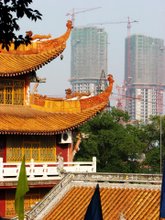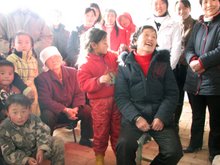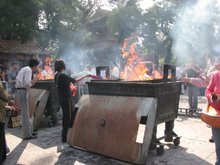Jumpstart, and Mr. Wang.
I have entered a new phase of my work in Chengdu. For the past month, although I haven't told you, or written anything about it in my blog, I have been running around like a nut meeting with different NGOs, interviewing small and medium sized business entrepreneurs, and participating in life in China. I was connecting, building the network, understanding my new turf etc. It was very fun, incredibly eye opening, and now I'm ready to share. Luckily, phase two includes basically continuing what I was doing before, only with a more specific focus, and in balance with the necessary reporting, reflecting, and sharing. In order to jumpstart this process, I’m going to start with now, and backlog only when it seems absolutely essential or fun.
I just got back from a 10 day trip to Beijing, an incredible vortex of a city. While my intention for this trip was to mix work and meetings with an appropriate amount of tourism, somehow I'm back in Chengdu without having seen the Great Wall, the Forbidden City, the Silk Market, or anything on a standard tourist checklist. There is so much happeneing in China related to sustainable development and socially responsible business, it's hard to prioritize anything that doesn't seem to be moving with the same light speed. Also, the Great Wall, despite whatever yesterday’s New York Times article claimed, will be there on my next trip, whereas China’s economy is obviously not going to wait, and some of the small organic farmers I met with are so close to bankruptcy its unclear what their future holds.
Anyways, one of my favorite expeditions on this trip to Beijing was an overnight with Mr. Wang at his organic company in Hebei, the province that surrounds Beijing. (For those of you who are unfamiliar with Chinese geography, Beijing has at least 13.8 million people, and it’s own provincial district.) I learned about Mr. Wang through my Buddhist friend Mr. He, who I meet for dinner or tea now and then in Chengdu. He is an aspiring organic shop owner, and had spent a lot of time learning about organics on Mr. Wang’s land. We made a few connecting phone calls, I coordinated graduate student translators from Renmin University, and Mr. Wang picked us up on Tuesday at 4.
Over the course of my stay, I learned that Mr. Wang lost part of his hand to an industrial workplace, and returned home to watch his mother, aunt, and several friends succumb to cancer. After this series of events, he used his savings to buy a large plot of land, started growing food without chemicals, which he knew were bad for the environment and health: basically independently inventing organic farming. Now he has an organic peach orchard, vegetable gardens, wheat and corn fields, facilities to make flour, and over 500 free range organic chickens... but he's virtually bankrupt.
This is because Mr. Wang is a social entrepreneur: he has an incredible vision of positive changes for his community, and he is using his business to generate those changes. Unfortunately, the financial/business component of his business often gets compromised for what he understands as the greater goods, the promotion of organic farming techniques and a healthier lifestyle for his community. In his community Mr. Wang explained that local farmers are often struggling to get by, and feel trapped into pesticide intensive farming to keep their yield and profits high. They think Mr. Wang is insane, and judging strictly by his bank account, it’s not hard to see why.
At the same time, there are tremendous opportunities for Mr. Wang’s business to be profitable while having an even greater positive impact on the community and the environment. First, although I’m not entirely sure on this one, I bet Mr. Wang is the only person in Hebei and Beijing who produces free range organic chicken, and if he could connect to a market like a healthy food store or restaurant rather than allow neighbors to take his chickens at will, that alone would probably pull his company out of the fire. There are many issues that complicate this process, like Mr. Wang’s seasonal approach to organics, which means he cannot provide a constant supply of X year round, and more importantly, the massive skepticism of organics in China due to false labeling, and the very small, albeit rapidly growing class of people who care about organics and can support slightly higher prices; but I think it is possible. Secondly, Mr. Wang has recently received support from a local government official who sees the organics as a viable economic model for his predominantly agricultural constituency, and third, the growing NGO community in Beijing that is focused on organic and community supported agriculture development, the environment, and small business development.
Right now we are working to connect Mr. Wang and his local official to a few interested members of the NGO community, two restaurant owners, and a team of business and agriculture graduate students from Renmin University to start a dialogue that may lead to a strategic plan of some sort for Mr. Wang. Unfortunately from Chengdu, I cannot be too involved in this process, but hopefully I passed the idea on to the right people, and there will be exciting news on my next visit.
Mr. Wang sent me home with a bag full of left over vegetarian whole wheat baozi, which is a kind of steamed stuffed dumpling, home made whole wheat noodles, corn pancakes, 6 apples, and 2 kilos of giant carrots. I tried to sneak gas money for his 8-hour van ride to pick me up in Beijing as well as all of the food and produce, but was obviously thwarted.
When my flight from Beijing landed in Chengdu (thank god) I felt like I had been given a new pair of eyes. Eyes that could see vivid color, detail, and long distance for example. Smog in China is oppressive and claustrophobic, but people adapt and adjust in the same way that they adjust to everything else that is whirling around them. Perhaps my new eyes can also see a little bit more of the “Chinese situation”, the road blocks that make so many good ideas infinitely complex, and the daily workload for China’s massive agrarian population. If only we could nicely ask everyone and everything to stop, let the winds clear the air, and let everyone really see the impact of the development that is taking this country by storm.
Monday, November 27, 2006
Subscribe to:
Comments (Atom)



